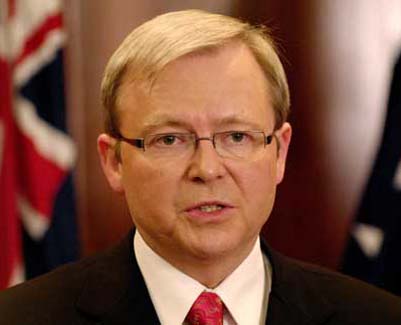Australia''s spy chiefs cross swords over China, but Rudd favours hawks
 Canberra (Australia), Apr. 11 : Defence strategists have ignored the advice of Australia''s most senior intelligence chiefs and rejected the view that China''s military expansion poses little threat to the nation''s long-term security.
Canberra (Australia), Apr. 11 : Defence strategists have ignored the advice of Australia''s most senior intelligence chiefs and rejected the view that China''s military expansion poses little threat to the nation''s long-term security.
The standoff between the intelligence doves and defence hawks has gone all the way to Kevin Rudd personally, reports The Australian.
But the hawks have won, and Australia will spend over 100 billion dollars over the next two decades to boost its naval and air war-fighting capacity.
The rise of China will shape Australia''s defence planning for a generation.
The Rudd Government''s defence white paper, due out later this month, will call for a more potent and costly maritime defence for Australia. The expansion of Australia''s sea and air defences will include a doubling of the submarine fleet, 100 joint strike fighters, new spy planes, as well as powerful new surface warships.
The divisions between the defence chiefs and Australia''s top intelligence assessment agencies, the Office of National Assessments and the Defence Intelligence Organisation, were so strong that ONA chief Peter Varghese felt compelled to write to the Prime Minister late last year expressing his concern about the China debate and how it could distort Australia''s national security priorities.
Varghese''s concern was that the white paper drafting team led by Defence Department deputy secretary Mike Pezzullo appeared to ignore comprehensive assessments prepared by the intelligence agencies on China.
The deep rift inside the defence and intelligence community - kept secret until now - reflects strong differences over how to assess China''s long-term capabilities and intentions, including plans to acquire long-range submarines and aircraft carriers.
The bruising debate over whether China''s military build-up could eventually threaten the regional security order resulted in a clear win for Defence hardliners led by Pezzullo.
Tipped as a future Defence Department chief, the hard-driving Pezzullo shares Rudd''s view that Australia should adopt a "hedging" strategy on China''s future strategic trajectory.
The ONA and DIO assessments agree that the least likely, but the most dangerous, long-term threat to Australia''s security was the prospect of war between the US and China. (ANI)